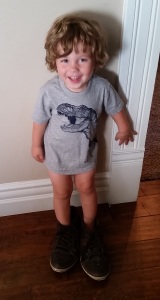 I adore watching my 3 year old son attend to a task and persevere. This morning he got himself out of bed, announced he had to “go pee pee” and marched into the bathroom by himself. He still wears a nighttime diaper, so he requested help getting the diaper off. I responded, “Try it by yourself, first.” He carefully placed his ball on the counter, plopped himself down, and then tried about 3 different ways to get the diaper off before he was successful. At no point did his tenacity wane, and when he got the diaper off he looked up and said,
I adore watching my 3 year old son attend to a task and persevere. This morning he got himself out of bed, announced he had to “go pee pee” and marched into the bathroom by himself. He still wears a nighttime diaper, so he requested help getting the diaper off. I responded, “Try it by yourself, first.” He carefully placed his ball on the counter, plopped himself down, and then tried about 3 different ways to get the diaper off before he was successful. At no point did his tenacity wane, and when he got the diaper off he looked up and said,
“I take it off like undies!”
Once he was done with the deed, he sat down and put his jammie pants back on. Again, he failed on his first attempt (both feet went down the same leg). So he pulled his foot out and tried another method. This time he stuck his arm down the correct path as if to clear the way. With this, he was successful. Upon further inspection it turns out that along with having on no undies, his pants are also on backwards. Did I tell him to take his pants off and try again? Absolutely not, because he completely the task well enough and he did it independently. When finished, he trudged upstairs to my husband and announced, “I went pee pee. I took my diaper off like undies!”
The implications for our instruction – in particular math instruction – are clear to me.
I did NOT tell him the steps to get his diaper off. There was no list of steps to take to get to the anticipated outcome. I did NOT tell him to stop when he was beginning to make a mistake. I did NOT tell him he did it wrong because he didn’t unlatch the diaper, or because he got the pants on backwards. I also did NOT praise him as we went. I simply watched, observed, and listened. He was doing this task on his own, so I stayed out of it.
So often in teaching, especially in math, we stop a child as soon as we see the mistake coming. But what if we allowed them to just keep on trying to fix their mistake? He had a clear outcome, and he knew he would be proud of himself for accomplishing the task. Do our students know their outcome? Not something general, like, “I can subtract with regrouping.” What about, “I can design a robot who gets the right answer every time when I subtract with regrouping.” Or, “I can find two ways that don’t work when subtracting with regrouping and explain why they don’t work.” I even like, “I can create a model that shows my thinking when I subtract with regrouping.” But even, “I can explain to a kindergartner what regrouping means” seems more interesting to me than the first.
Furthermore, the incentive to complete the task had nothing to do with an external bribe or reward. No points or stickers. Just pride in completion. The risk was also low. It’s not like I was going to call his parents if he didn’t complete the task. He knew he would simply get help. Do we offer students small enough steps that they can climb independently, allowing them to feel that pride of completion? Are we developing autonomy in our students, where they know what the next step is and how to get up it? Are we letting students discover fun and complex concepts on their own, allowing them the thrill of self-discovery!?
Here are some thoughts I have after watching my son remove his diaper:
-
- Do students have something exciting to go home and talk about?
-
- Do they know how they solved the task? Can they explain it?
-
- Do they care about how they solved the task? Is it a task worth caring about?
-
- Did you intervene while they were making a mistake?
-
- What did they do when they realized they were making a mistake?
-
- Did you praise them? Or did you allow them to explain their work so as to feel self-satisfied?
As parents of young children, we love watching them explore new worlds, making sense of this place around them. We ask questions, we guide lovingly, and we revel in their celebrations of their own success (“I did it!!”). And then something happens in the primary years. We seem to think these are ok until about 2nd grade, but by 3rd grade we expect them to be little adults. We forget that they are still children. There is still a 3 year old inside of them. We forget that some of them are still struggling to put their pants on the right way round. I say “we” because I am guilty of this, too. When I visit my ten year old nephew, it seems unreal to me that he is the same boy as in the 5th grade classes I visit. He is just a boy. I see the boy in my nephew. I hope his teachers do, too.
